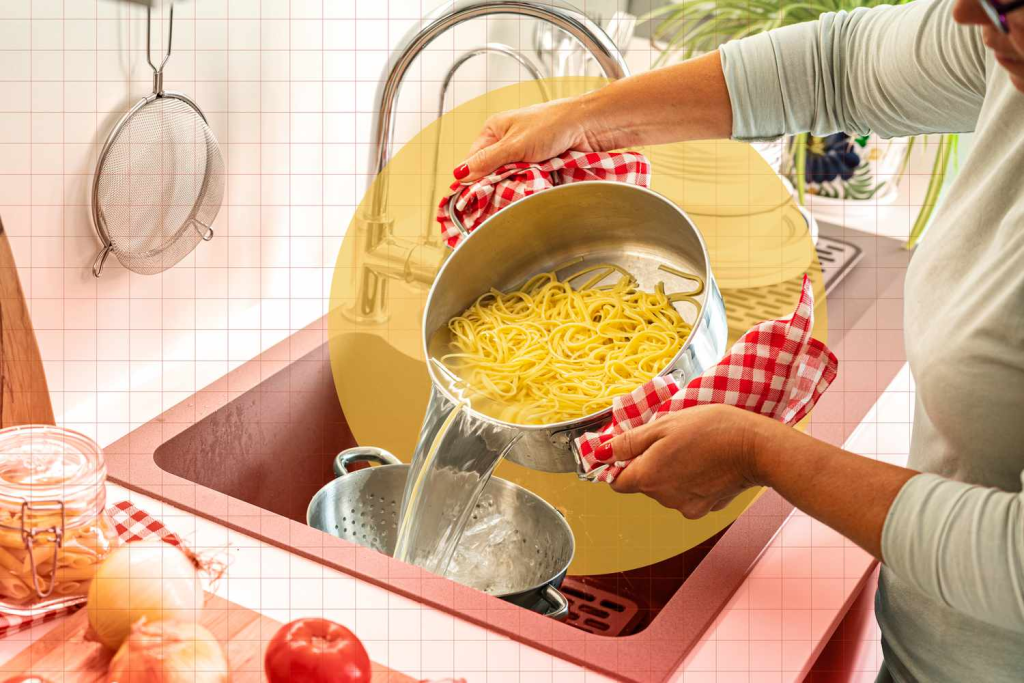Let’s talk spaghetti — and the kitchen clash that can ignite a dinner table debate. You boil the pasta, drain it, and then comes the moment of truth: do you rinse it off, or leave it saucy and sticky?
Recently, my partner cooked up a beautiful bowl of spaghetti marinara but skipped rinsing. I froze. To me, unrinsed pasta looked… sticky — like it might clump or get gummy. But does skipping the rinse really mess up the dish? Or is rinsing just an old habit that’s lost its flavor?
Let’s unravel the truth behind this classic pasta dilemma, bust some myths, and finally settle the score once and for all.
Why Did Rinsing Pasta Even Become a Thing?
Rinsing pasta isn’t just about cooling it down. That cloudy film you see when you drain pasta? It’s starch released during cooking. Some cooks rinse pasta to wash away this starch, preventing noodles from sticking and clumping together like glue.
This is especially common with cold pasta salads. A quick rinse chills the pasta fast and leaves a clean base for tossing with crisp veggies, tangy vinaigrettes, and savory proteins.
But when it comes to hot dishes? That’s where the debate heats up.
Video: Should You Rinse Pasta After You Cook It?
How Starch Shapes Texture and Flavor
When you boil pasta, starches break down and dissolve into the water. Rinsing your noodles afterward? You’re washing away that starch layer. Sure, rinsed pasta feels cleaner and less sticky—but you’re also stripping away the very thing that helps sauce cling like a dream.
Far from being the enemy, starch is actually your pasta’s best friend. It acts like edible glue, hugging every twist and turn so the sauce coats each strand perfectly.
Skip the rinse, and you keep that delicious bond intact. Rinse it off, and your pasta might end up tasting “naked,” with sauce slipping off instead of wrapping you in a comforting, flavorful blanket.
So if your partner skipped rinsing, chances are they were on to something—making sure every bite bursts with flavor and sauce stays right where it should.
The Science Behind Rinsing Pasta (or Not)

Here’s the scoop: rinsing pasta does change how it behaves in your dish. That leftover starch clinging to your noodles? It naturally thickens your sauce, creating that luscious, restaurant-quality finish.
That’s why chefs often skip the rinse, transferring pasta straight from boiling water into the sauce. As the pasta finishes cooking, it soaks up flavors and releases starch, making your sauce richer, silkier, and perfectly blended.
Craving creamy, glossy spaghetti that tastes like it came from a top kitchen? Skip the rinse—always.
When Rinsing Actually Makes Sense
Of course, there are exceptions:
-
Cold Pasta Salads: You want those noodles chilled fast to keep your greens crisp and dressing fresh. A quick rinse cools the pasta and halts cooking immediately.
-
Asian Stir-Fried Noodles: Rinsing removes excess starch that could gum up your stir-fry and ruin the texture.
-
Over-Salted Water: Accidentally over-salted your pasta water? Rinsing helps wash away some of that saltiness.
Bottom line: rinse when texture or temperature matters. Otherwise, let the starch do its magic.
Video: The Biggest Mistakes Everyone Makes When Cooking Spaghetti
